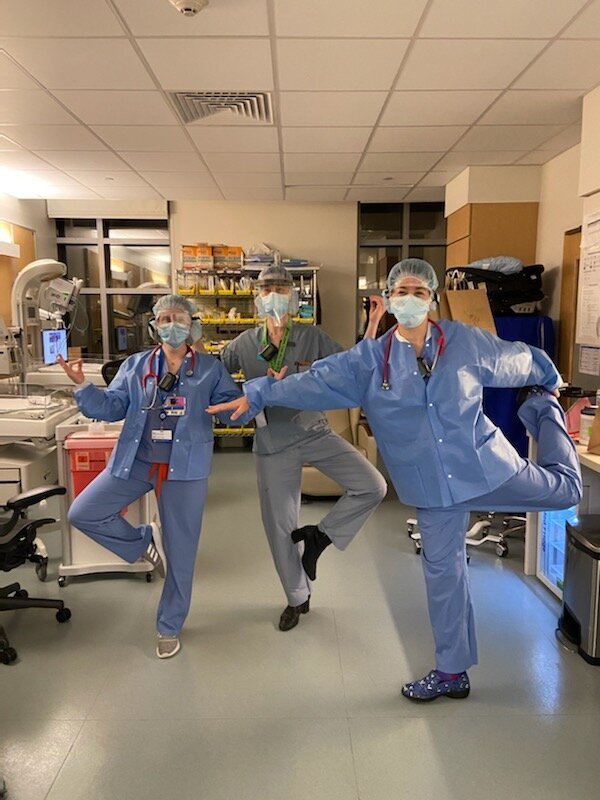Healthcare Heroes: An Interview with Dr. Annette Scheid
Dr. Annette Scheid, beloved Down Under student and community member, provides neonatal intensive care as a member of the Brigham and Women’s Hospital Department of Pediatric Newborn Medicine and is an Instructor of Medicine at Harvard Medical School. She is also active in clinically oriented research focused on understanding and developing effective interventions to address burnout/well-being in healthcare professionals and to ensure the highest standards of quality and safety in patient care.
We recently had the pleasure of interviewing Dr. Scheid to learn how she is protecting lives among one of the most vulnerable populations, how yoga is helping her deal with the unprecedented challenges that Covid-19 has presented in both the workplace and at home, and how her research is more relevant now than ever before.
DU: How has your role providing neonatal intensive care changed as result of Covid-19?
AS: Transmission of COVID-19 from infected mothers to their babies rarely occurs during pregnancy or delivery. The risk of a newborn becoming infected is after birth, when Mom starts to breastfeed and Mom, Dad and other family members come in closer contact with the baby. Major challenges and questions we deal with every day include: Do we separate or not separate COVID-19 positive mothers from their babies? How do we protect the other vulnerable preterm babies in the NICU unrelated to Covid-19? How do we protect ourselves and our colleagues from illness so as to continue to function as providers? How do we protect our families and loved ones from the risk of being ill ourselves and passing the virus on? Life has changed dramatically for us at work on many different levels. It has been extraordinary to see how our department and the departments within the hospital have shown up in solidarity and the general spirit of supporting each other.
DU: Describe the current hospital setting? What does it feel like to walk into the hospital each day?
As: Before entering the hospital each morning we have to complete an online survey on an app on our phones to attest that we do not have any symptoms related to COVID-19. When cleared, we receive a “work pass” for the day and can enter the hospital. We sanitize our hands and are handed a standard hospital mask and an N95 mask with visors for particularly high-risk situations. Strangely, the focus on the job to be done is so intense that everything else seems to fade away. At the end of the day, we exit the building, take off our masks, and take a breath before putting on a self-made mask. On the way home there is a whole internal process for many of us to transition emotionally back towards home and our families waiting for us there.
I have sensed struggle in separating my home environment and work life. The emotional and intellectual engagement is so different. And the stressors are so different that we walk into and out of so often. When I am outside the hospital, the fear of getting sick and not being able to provide care or support to my colleagues in providing care is very dominant.
DU: Has yoga played a part in your ability to provide for your patients day in and day out?
AS: Our attention is so intensely focused on providing care all the time that the whole concept of self-care can easily escape our attention if we don’t reserve time for it. Taking the particular time to quiet the mind and focus on mind/body and what is happening within has become as important as breathing for me. My ability to walk into the hospital and my ability to, despite stress, interact with colleagues, community and family members with kindness absolutely depends on it.
DU: How are you being supported?
AS: We have happy hour Zoom calls on Fridays with colleagues. We also have faculty meetings now twice per week (instead of every other week) for emotional support and to discuss rapid changes in practice under these unusual circumstances. These regular gatherings, practically and emotionally, make us all feel like we are on a team working together against something larger than ourselves. I also share my experiences with my kids – it helps them understand why I’m going away and what I’m working for.
DU: Tell us about your research?
AS: I’m co-writing a grant proposal for the National Institute of Health (NIH) in collaboration with colleagues from Stanford University and Duke University. The purpose is to look closely in newborn intensive care and determine whether physician burnout leads to impaired quality of patient care. The other purpose of the study is to look into what the major drivers of healthcare provider burnout in neonatology are. Ultimately, the goal will be to develop interventions to effectively decrease provider burnout rates, which nationally affect up to 50% of our healthcare providers.
The study they are currently submitting focuses on advanced care providers; in a second step, Dr. Scheid intends to focus her attention on nursing and other members of allied health such as respiratory therapists.
Dr. Scheid was quick to convey her deepest respect for nurses and all other healthcare providers working with physicians. She said, “Each of us are leaders in our own way, we all provide skills that are different, complementary, and absolutely essential. The engagement everyone has shown during these times has been amazing. Last night a nurse came back in for a shift at 11p.m. after only having left the hospital at 3 p.m. because help was needed. She has three children at home. I was struck in awe.”
We are also in awe of Dr. Scheid’s continued commitment to her patients and to her community of healthcare providers. Which is why it is our honor to feature her story and provide her, and hundreds of other healthcare providers, with a means of self-care – free yoga is the least we can offer.


